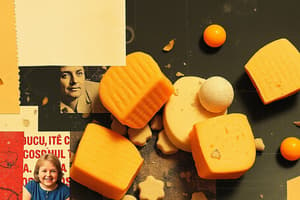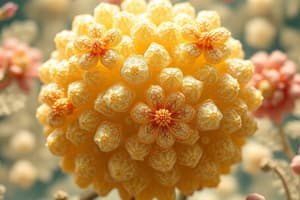Podcast
Questions and Answers
What are disaccharides composed of?
What are disaccharides composed of?
- Complex carbohydrates
- Single monosaccharide units
- Polysaccharides
- Pairs of monosaccharides (correct)
What process must disaccharides undergo before absorption in the body?
What process must disaccharides undergo before absorption in the body?
- Hydrolysis (correct)
- Glycolysis
- Oxidation
- Fermentation
Which disaccharide is known to be one of the sweetest and least expensive sugars?
Which disaccharide is known to be one of the sweetest and least expensive sugars?
- Lactose
- Sucrose (correct)
- Maltose
- Fructose
Which of the following is NOT a type of disaccharide?
Which of the following is NOT a type of disaccharide?
What is maltose primarily associated with?
What is maltose primarily associated with?
What distinguishes lactose from other sugars?
What distinguishes lactose from other sugars?
Which source is NOT associated with sucrose?
Which source is NOT associated with sucrose?
Which disaccharide is created during the fermentation process that produces alcohol?
Which disaccharide is created during the fermentation process that produces alcohol?
Which carbohydrate is primarily the storage form of glucose in plants?
Which carbohydrate is primarily the storage form of glucose in plants?
What is the primary function of glycogen in the body?
What is the primary function of glycogen in the body?
Which type of fiber is characterized as indigestible and does not dissolve readily in water?
Which type of fiber is characterized as indigestible and does not dissolve readily in water?
Which polysaccharide is commonly found in grains and vegetables?
Which polysaccharide is commonly found in grains and vegetables?
What is the role of the hormone glucagon in relation to glycogen?
What is the role of the hormone glucagon in relation to glycogen?
Where is glycogen mainly stored in the body?
Where is glycogen mainly stored in the body?
Which polysaccharide cannot be broken down by digestive enzymes?
Which polysaccharide cannot be broken down by digestive enzymes?
Which of the following is a source of starch?
Which of the following is a source of starch?
What is the minimum daily intake of carbohydrates needed to spare proteins for their primary function?
What is the minimum daily intake of carbohydrates needed to spare proteins for their primary function?
What is the primary function of carbohydrates in the body?
What is the primary function of carbohydrates in the body?
What is glycogen?
What is glycogen?
What consequence can occur with an inadequate supply of carbohydrates?
What consequence can occur with an inadequate supply of carbohydrates?
Which of the following is NOT a benefit of dietary fiber?
Which of the following is NOT a benefit of dietary fiber?
How many calories does each gram of carbohydrate provide?
How many calories does each gram of carbohydrate provide?
What compounds are produced as a byproduct of fat metabolism when carbohydrates are insufficient?
What compounds are produced as a byproduct of fat metabolism when carbohydrates are insufficient?
Which statement best describes the role of carbohydrates in normal fat metabolism?
Which statement best describes the role of carbohydrates in normal fat metabolism?
What is the primary source of carbohydrates in the human diet?
What is the primary source of carbohydrates in the human diet?
Which of the following is a monosaccharide?
Which of the following is a monosaccharide?
Which of the following sugars is also known as fruit sugar?
Which of the following sugars is also known as fruit sugar?
What type of carbohydrates is primarily stored in animal organisms?
What type of carbohydrates is primarily stored in animal organisms?
Which monosaccharide is primarily used as fuel for the central nervous system and red blood cells?
Which monosaccharide is primarily used as fuel for the central nervous system and red blood cells?
What is a significant characteristic of disaccharides?
What is a significant characteristic of disaccharides?
Which carbohydrate is not naturally found in foods and is produced during milk digestion?
Which carbohydrate is not naturally found in foods and is produced during milk digestion?
Which of the following foods is a notable source of fructose?
Which of the following foods is a notable source of fructose?
Which enzyme is responsible for breaking down lactose into glucose?
Which enzyme is responsible for breaking down lactose into glucose?
What changes occur to fructose and galactose after absorption into the bloodstream?
What changes occur to fructose and galactose after absorption into the bloodstream?
How does starch digestion begin?
How does starch digestion begin?
What is the primary function of insulin in glucose metabolism?
What is the primary function of insulin in glucose metabolism?
What can result from a diet that is severely deficient in carbohydrates?
What can result from a diet that is severely deficient in carbohydrates?
What is the recommended percentage of energy requirements that should come from carbohydrates according to dietary guidelines?
What is the recommended percentage of energy requirements that should come from carbohydrates according to dietary guidelines?
What might excessive carbohydrate intake lead to?
What might excessive carbohydrate intake lead to?
What is a direct consequence of impaired insulin secretion?
What is a direct consequence of impaired insulin secretion?
Study Notes
Disaccharides
- Composed of two monosaccharides, disaccharides are soluble in water and must undergo hydrolysis to become absorbable simple sugars.
- Major types include:
- Sucrose: Combination of glucose and fructose; found in sugars like granulated, brown, and powdered sugar, as well as molasses. Sources include sugar cane, sugar beets, and maple syrup. Known for being sweet and inexpensive.
- Maltose: Forms during starch hydrolysis; produced during alcohol fermentation. Found in beer, malt beverages, and some infant formulas. Less sweet than glucose or sucrose.
- Lactose: Sugar present in milk, unique for not occurring in plants. Aids calcium absorption but is less sweet than other sugars.
Polysaccharides
- Comprise multiple monosaccharides and serve as complex carbohydrates; include starch, glycogen, and fiber.
- Starch: Storage form of glucose in plants, found in grains and vegetables; provides a sustained energy supply due to slower digestion.
- Glycogen: Often referred to as animal starch; it is the glucose storage form in animal bodies, with glucagon facilitating its conversion back to glucose when needed.
- Fiber: Indigestible; classified into soluble (partially dissolves in water) and insoluble (does not dissolve). Includes cellulose, hemicellulose, and lignins.
Sources of Polysaccharides
- Starch: Present in cereals, grains, potatoes, corn, and yams.
- Glycogen: Stored primarily in the liver and muscles.
- Cellulose: Found in whole grains, fruits, and green vegetables.
Carbohydrate Facts
- Main energy source for the body, abundant and cost-effective.
- Composed of carbon, hydrogen, and oxygen; classified into monosaccharides, disaccharides, and polysaccharides.
Functions of Carbohydrates
- Provide immediate energy.
- Support protein-sparing, allowing proteins to fulfill their primary role in tissue building.
- Promote normal fat metabolism.
- Supply dietary fiber, vital for digestive health.
Caloric Content
- Each gram of carbohydrate yields 4 calories. Carbohydrates are stored as glycogen in the liver and muscles for energy use.
Protein-Sparing Action and Metabolism
- Adequate carbohydrate intake (50–100 g/day) preserves protein for tissue repair rather than using it for energy.
- Insufficient carbohydrates lead to fat metabolism for energy, potentially causing ketosis due to ketone accumulation in blood and urine.
Dietary Fiber
- Found in grains, vegetables, and fruits; recommended intake is 20–35 g/day.
- Benefits include lowering blood glucose, preventing constipation, and potentially reducing colon cancer risk.
Food Sources
- Predominantly from plant foods such as cereals, grains, vegetables, and fruits, with milk being the only significant animal source.
Classification of Carbohydrates
- Monosaccharides: Simplest form, directly absorbed into the bloodstream (e.g., glucose, fructose, galactose).
- Disaccharides: Simple sugars formed by two monosaccharides.
- Polysaccharides: Complex carbohydrates that include many sugar molecules.
Digestion and Absorption
- Monosaccharides: Absorbed directly; fructose and galactose convert to glucose in the liver.
- Disaccharides: Require specific enzymes (sucrase, maltase, lactase) for conversion to glucose.
- Polysaccharides: Digestion begins in the mouth; starch is converted to dextrin and then to maltose before becoming glucose.
Metabolic Regulation
- Insulin from the pancreas regulates glucose metabolism. Imbalanced levels can cause hyperglycemia (high glucose) or hypoglycemia (low glucose).
Dietary Requirements and Recommendations
- Carbohydrates should comprise half of total energy intake, ideally from complex sources. Deficiencies can lead to fatigue and ketosis.
Conclusion
- Carbohydrates are essential for energy, spare protein, maintain fat metabolism, and provide fiber. Excess consumption can result in health issues like obesity and digestive disturbances.
Studying That Suits You
Use AI to generate personalized quizzes and flashcards to suit your learning preferences.
Description
Explore the world of disaccharides, including their structure, functions, and how they are formed from monosaccharides. This quiz covers key examples such as sucrose, maltose, and lactose, providing insights into their absorption process and importance in nutrition.



